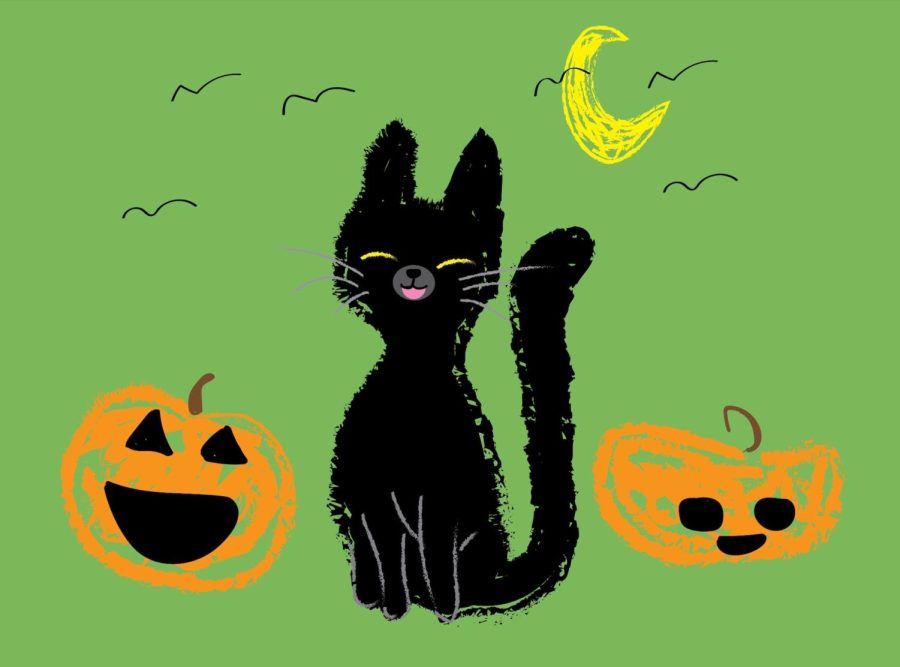On black cats: Leave the superstitions in the past
October 24, 2022
Black cats should no longer be the mystified, superstition-riddled poster children of Halloween. They never asked to be.
Every Halloween, there is a fascination with the eerie, the unsettling and the undead. Decorations for this annual celebration are ridden with black cats. They possess bright yellow eyes and are often depicted with a back arched in fear, anticipation or a simple stretch.
Black cats get a spotlight during spooky season, but because people believe the century-old superstitions, they face trouble with adoption and euthanasia the remainder of the year.
On the history
Cats had a presence in ancient Egypt as symbols of divinity and in Greek mythology as an accompaniment to Hecate, the goddess of magic and the bridge between the living and the dead, according to an information page from Britannica.
Black cats were later recognized as the living representations of Satan and then as the familiars, low-ranking demons that assumed any animal shape, accompanying witches in Medieval Europe, according to Britannica.
Witches and their supposed familiars were hunted, tormented and executed, as they were perceived as a threat to the Christian Church. This ideology moved into the North American colonies by way of the Puritans in the late 1600s, when the Salem Witch Trials unfolded, according to an Oct. 13, 2021 History article.
Cats are very useful animals in the controlling of rodents and other pests, as well as for companionship and emotional support. Despite this, they continue to be associated with evil, witches and Satan, according to the History article.
It is even said that Tituba, a Caribbean slave accused of witchcraft, confessed to having seen the devil along with images of black dogs, red cats and yellow birds. Cats and dogs of all kinds, especially those with black coats, were persecuted as they were believed to be familiars, according to an Oct. 23, 2007 Smithsonian article.
The modern world
Though we are no longer accusing our neighbors of witchcraft, the superstition of black cats still exists. We now have central heating, electricity and running water, but we are still holding on to an ancient myth.
Today, a cat having a brown coat instead of a black one decreases its odds of euthanasia by 21.1%, according to a Sept. 23, 2020 study from Animals.
From my experience, there is no personality difference in black cats compared to cats with other coat colors and their temperaments despite their coat color.
In spite of the myths regarding black cats, owners of black cats report their primary trait is their friendliness, according to an April 15, 2022 study from Animals.
Still, each Halloween, the old black cat stereotypes seem to resurface. In pairing zombies that eat brains and vampires that drink blood with the innocent black cat, we categorize these harmless creatures as fear-evoking monsters.
Another myth is that black cats are sacrificed on Halloween as part of a demonic ritual. This leads cat-lovers to beg that shelters do not allow the adoption of black cats around Halloween, meaning these felines inhabit shelters for longer, according to the Kentucky Humane Society.
Superstitions are not fact. Just like how stepping on a crack will in no way break your mother’s back, a black cat crossing your path does not bring bad luck.
Speaking truthfully, in a world where cats are ridiculed enough for their moodiness and supposed standoffish nature, black cat superstitions are just another harmful narrative that permeate unwarranted animal cruelty and neglect.
I’m not advocating that the whole world adopts black cats, but let’s let go of the false stereotype we have around them. It is harmful to black cats that we assume their color indicates relation to demons and the underworld.
We now have science and no longer need to base phenomena on urban legends and myths. Weird and creepy things do indeed happen, but I can assure you it’s not the fault of your neighbor’s midnight-colored feline.
